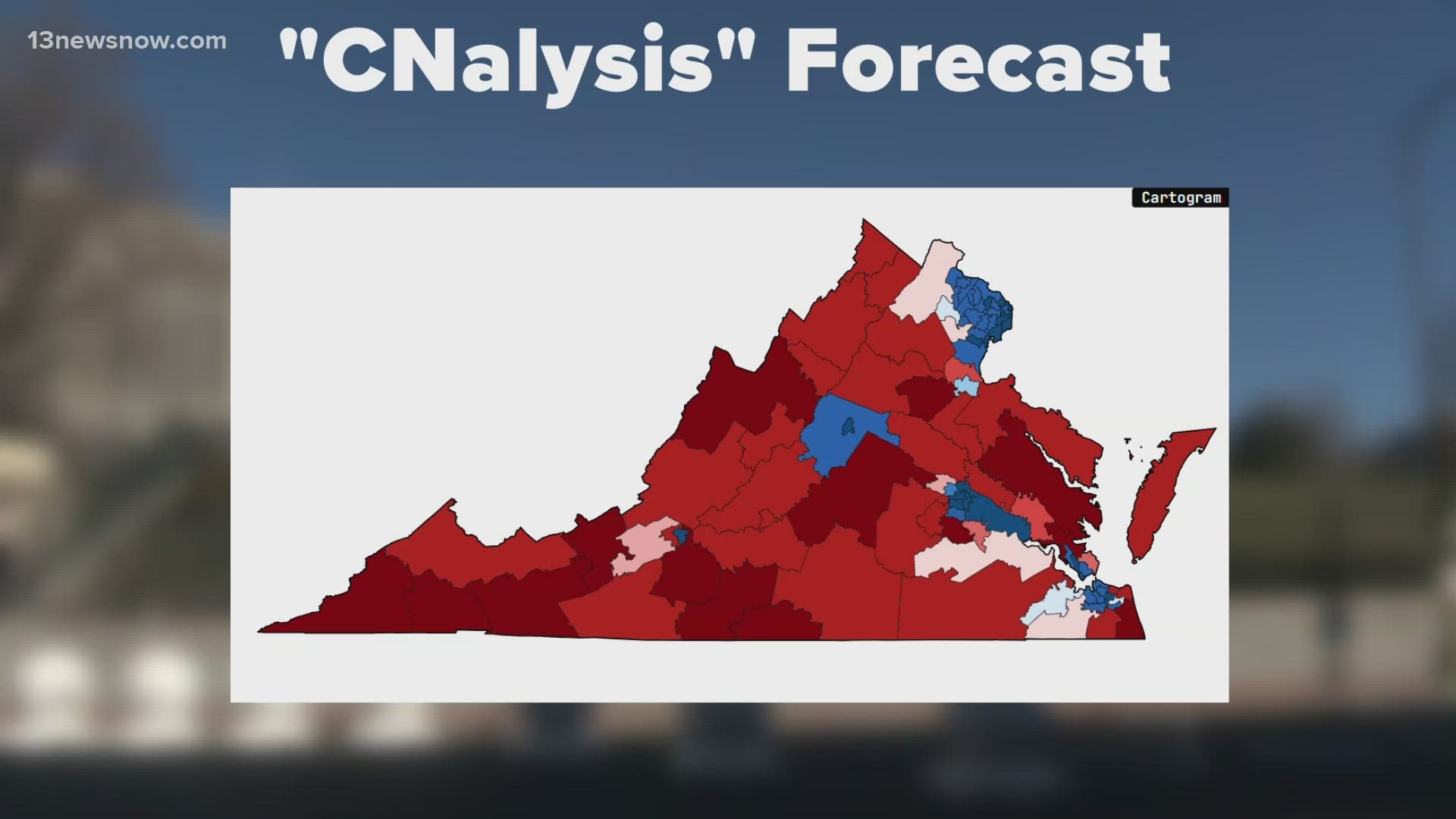NORFOLK, Va. — As the country watched Democratic candidates take control of both chambers of the Virginia General Assembly in the high profile state elections, Virginia Tech senior Chaz Nuttycombe knew he had beaten everyone else to the punch.
Nuttycombe, a political science major, correctly forecasted the results of every one of the 140 General Assembly races on the ballot this November.
Nuttycombe has ties to Hampton Roads. He was originally born in Newport News before his family moved outside of Richmond. Much of his extended family resides in, or has resided in Newport News for years.
He spoke to 13News Now about the methodology and what went into the predictions on the forecasting website "CNalysis," which he started in 2020.
Alex Littlehales: You wrote a reflection on this election cycle headlined "The 2023 Virginia Election Was Easy to Predict." Why is that?
Chaz Nuttycombe: We got a lot of data that other forecasters didn’t have going back to 2019. We did the prep work, I've been doing this for six years so have a lot of experience with Virginia. I've been following the special elections to help determine the environment. I also have a good relationship with both sides of the aisle, they would be giving me [information]-- sometimes from the person I'm talking to-- polling data for every district. Based on data I was privy to I had already figured out that most voters who were Republican and voted early were high propensity voters. So they were going to vote on election day anyway. The exception were these mid-propensity voters from the south side. That’s what led me to pick Del. Kim Taylor in House District 82, even though that's still close I knew it would be pretty close. But I thought either side would win by less than 1 point. I also knew that Emily Brewer would do well in State Senate District 17.”
AL: What is the biggest factor in your analysis and your modeling? Voting numbers, partisan lean, something else more in depth?
CN: Just being able to go back four years of election data. That's what weighed the most, that's what's known as the base rating. These are both quantitative and qualitative ratings, but also a basis based on the election results. We look at the campaign finances, whatever polling data we could gather, to help us determine what the rating should be in that forecast.
AL: So when there was a conversation about a Republican "Trifecta", you always thought maybe that was bullish or pre-mature? That was a good amount of the national conversation, the question of whether Gov. Youngkin and Republican candidates can do enough? But your predictions were the opposite. I think people thought Democrats keeping the State Senate was realistic, but maybe the House of Delegates was more of a surprise? You were on that train early, any thoughts on your predictions versus the conversations surrounding the elections?
CN: In September I could have seen the Republicans taking the House, maybe even in October, but it started to get tricky in October. I moved House District 21 from Prince William from toss up to [leaning] Democratic. A week or two later we moved House District 97 from toss up to Democratic. I thought these were going to be toss ups all the way until the final ratings. Had been seeing movement for democrats through October...
What I don't appreciate from Republicans, from what I've seen, is them saying this is a "victory" and they did really well because they won some Biden districts. Presidential races aren't predictive of legislative races...
You had so many more close Republican races than the tipping point, which was House District 97 and Michael Feggans won by almost five points. And you have these other Republican candidates winning by less than two points. We were closer to a bigger democratic lead than a Republican 'Trifecta.'"
AL: You went 140 for 140 [predictions], so it’s hard to ask what did surprise... but is there something that did surprise you? Whether that’s a race, or data that helped you to the conclusions you got?
CN: Yes, I did get every district right, but there were races that either were going to be closer or were closer than expected.
AL: Is this a hobby for you? Is the hope that this is the next FiveThirtyEight? What’s the hope for "CNalysis"? And the others who are a part of this effort.”
CN: It started in 2020, with a staff smaller than what we have now. There are nine of us total. Most are in our early 20’s. It was just a place to put my predictions and whatnot, and just got really really big. The goal is yes, to do this for however long. Throughout my rest of time at Virginia Tech I'll be working on other content, I've been wanting to get into related to state legislature. What I would like to do something that’s a combination of 538, Politico and the Virginia Public Access Project, sort of all in one.
You can see who won and lost each of the races in our region here.

